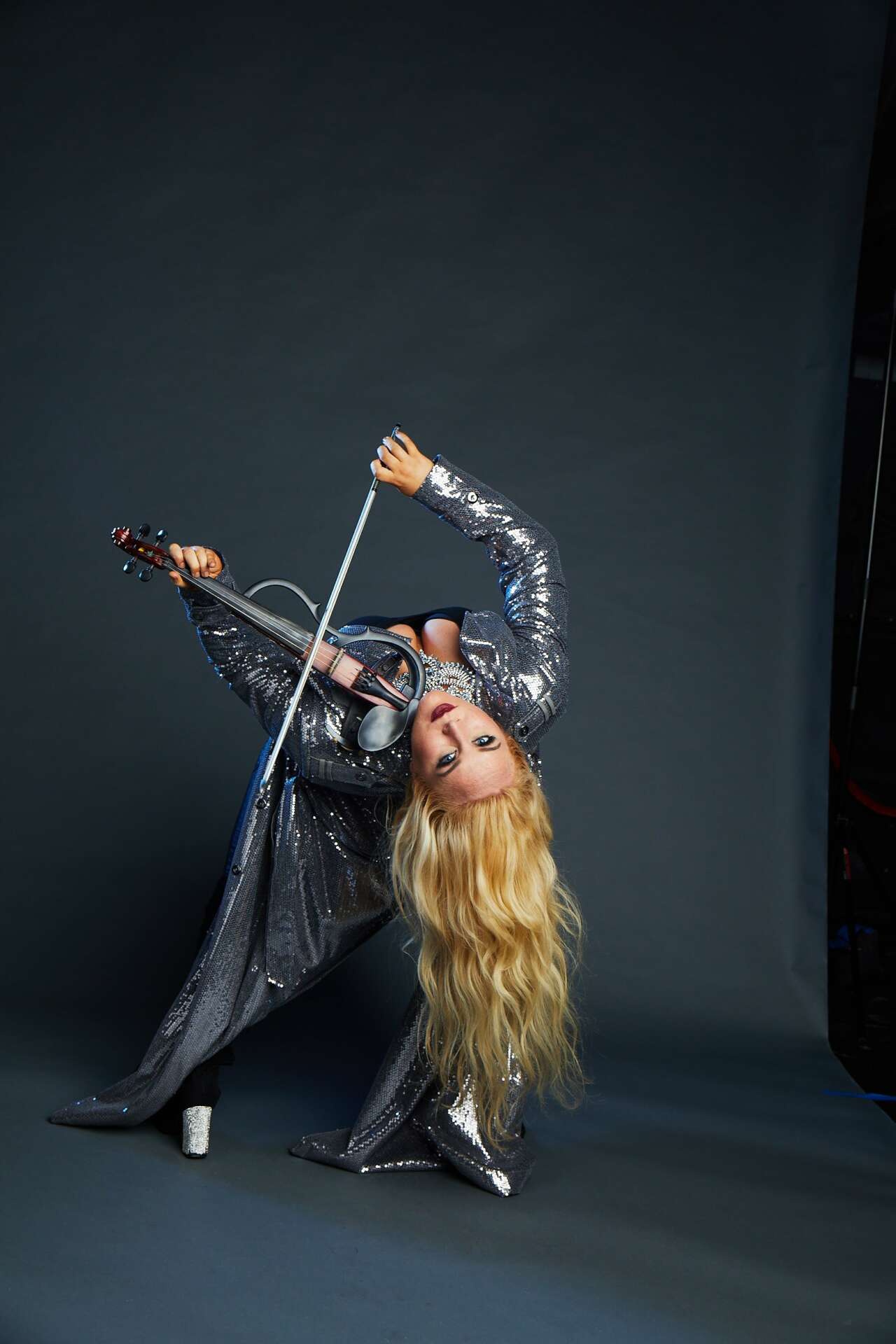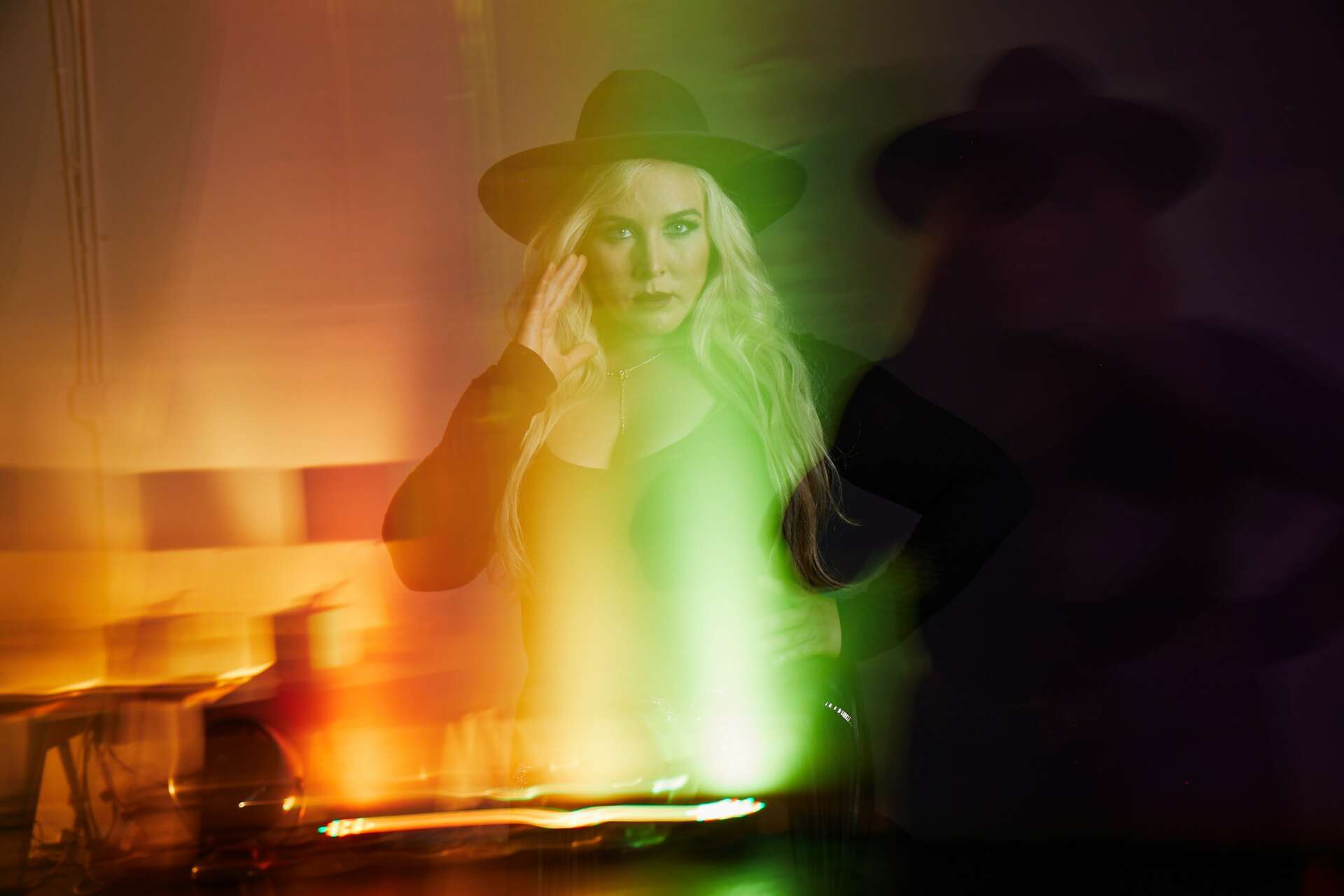We were lucky to catch up with Ginny Luke recently and have shared our conversation below.
Ginny, thanks for joining us, excited to have you contributing your stories and insights. Can you talk to us about how you learned to do what you do?
I get to play electric violin and sing on arena stages and travel the world. Despite the music industry’s challenges and hardships, I am thankful a small town girl from Dubuque, Iowa has gotten to pursue her dreams on an international level (and I’m still pursuing!).
I now work in the music industry as a recording artist, touring and session violinist and vocalist for major artists, educator at USC Thornton School of Music, and as a producer and songwriter. I created a lane for myself in rock electric violin and as a pop/rock songwriter and string arranger. In addition to my own career, I manage string groups SAGA Strings, Gin & Lace, and DJ/Violin duo Elektro-Femme.
While building my career (in this insane city), I think back on the work it took to get here. I moved to LA at 15. I worked three jobs at 17 while attending high school (home schooling and Interlochen Arts Academy, Colburn School of Music) and college (Musician’s Institute, CalArts). I negotiated my own deals and contracts early on, dealt with producers who weren’t looking out for my best interests, and traveled on tour buses with with all men. I can say I am proud to exhibit strength and integrity just as strongly as my musicianship. I also feel blessed to look back and cherish the valuable musical and business lessons I learned from artists like Dave Grohl, Meat Loaf, Dave Matthews, Nicki Minaj and Avril Lavigne.
I would only be able to do this from learning classical music at a young age.
I always loved Britney and Christina, but also had to study Itzahk Perlman and Heifitz, Renee Fleming and Maria Callas. I loved songs like Missy Elliot’s “Get Ur Freak On” at 12 (12! Is that age appropriate? I’m hoping so) but also had to reign it in when I got home from school and practice violin.
I started violin, piano, and ballet at age 3 in Germany on an army base. My mother is a pianist, and my father is a conductor. and doctor. All 3 of my brothers and I had to learn a solo instrument as well as piano. The household rule growing up was “each Luke kid plays their instrument age 3 until the age of 18”. Practicing was non-negotiable – we practiced our instruments on birthdays and Christmas, played in band, orchestra and choir, and attended music camps in the summer.
We moved to Dubuque, Iowa when I was 4 years old. It was a simple town to grow up in but effective in keeping us focused on music and academics. Every day I woke up at 5:30 or 6am and practiced an hour before school, then after school a minimum of 2 hrs of violin and piano. In the summer I had to practice 3 to 8 hours a day, depending on if I was at a classical music festival or home.
From age 4-14 I also sang and danced in musicals at the Grand Opera House, and competed in local and dance competitions with the Dubuque Dance Company.
Violin competitions and auditions started around age 9, and my violin study was under Doris Preucil who founded the Preucil School of Music in Iowa CIty, Iowa.
At 14, I soloed with the Cedar Falls symphony (on Mendelssohn Violin Concerto), and played Carnegie Hall at 16 while attending Interlochen Arts Academy.
I moved to to Los Angeles to sing, act and perform in a girl-band and spent ages 15, 16, 17, and 18 performing and recording. Inevitably the girl band broke up and I began attending Musician’s Institute, studying keyboards and vocals. During this time (ages 19 and 20) I got asked to record and tour with rock legend Meat Loaf, and my whole career changed. All of my classical training was vital in learning and performing his music, and from then on it led to recording for Snoop Dog, J.Cole, the Black Eyed Peas, Britney Spears, Miguel, Hozier, and many others.
Now I get to record my own music under music label KZZ/Sony Orchard and collaborate with musicians such as Onree Gill (Alicia Keys) and Orianthi (Alice Cooper) on my own music, which is the most fulfilling in my artistic career.
The skills that I feel were most essential to launch and sustain my career in music were extreme focus, musical versatility, a calm and positive attitude, and perseverance. Women and especially young people have it tough out here – LA is no town for the meek, and young people have to not only have a vision of what they want to create, but they have to rely on themselves and find the opportunities and resources to make it become a reality.
The traits I feel are essential for surviving and thriving in the music industry are pretty simple I think – commitment to your instrument, some street smarts, and a ferocious commitment to not giving up.


As always, we appreciate you sharing your insights and we’ve got a few more questions for you, but before we get to all of that can you take a minute to introduce yourself and give our readers some of your back background and context?
I am a recording artist with an upcoming album under KZZ/SONY Orchard, and a classical and rock violinist, songwriter and producer.
I have performed and recorded with recorded with artists such as Britney Spears, Black Eyed Peas, Will.I.Am, the Foo Fighters, Snoop Dog, Ashe, Finneas, J.Cole, Miguel, Daniel Caesar, Hozier, Dave Matthews Band, Avril Levigne, Miguel, 6lack, Amber Mark, Iggy Azalea, Ruben Studdard and Stevie Wonder, Englebert Humperdinck and TianaMajor9, (among others), on the Latin Grammys with Ricky Martin and Miguel Bose, and on the American Music Awards with Nicki Minaj, Skylar Grey, and Shawn Mendes.
I developed and wrote the curriculum at University of Southern California’s Pop Thornton Program for the Pop Strings course, and work with artists age 10 and up on vocals, stage presence, songwriting, and acoustic and electric string technique.
I am most proud of my work in speaking up for women in the music industry, and artistically empowering people through my songs by defying stereotypes of classical violin and classical violin.
My solo music is strong, loud, and places the violin in a new context as the lead guitar role. My songs are gutsy and bold, and my goal is to lift up people to find their strength through my music.
You can find me writing songs, recording with major artists in the studio and working on my upcoming record.

What do you think is the goal or mission that drives your creative journey?
Some people in the music industry are helpful and kind, some are malicious. The hurtful people reveal their own insecurity, and the “old guard” is changing. Domineering producers and music directors still run things, but we are transitioning into a time of younger people stepping into leadership. More and more women and LBGTQIA+ creatives are finding their power and becoming community leaders. I am continually learning how to keep my head high, maintain my ethics, and become a better community leader. I have experienced some of the worst experiences one probably could in the industry, sexual assault, emotional abuse while recording, not getting paid from major shows, business manipulation – but I have learned to uphold my power and my value. I practice and continue to insist on surrounding myself with good and kind people, make music that resonates with me, speak up for oppressed musicians, and remind myself I hold my own power, because I am a good musician and a good person. All of this goes back to my upbringing and music education, the educators and mentors that helped me grow, and the musicians I surround myself with now. We all have the same thing in common – we all want to create high level music.
The goal driving my work in music is supporting and paving the way for other assault survivors to continue finding fulfillment and meaning in their lives.

How can we best help foster a strong, supportive environment for artists and creatives?
Artists and creatives have always needed support to develop and thrive, and will always need support because art reflects culture and helps us understand our own human experience. The time and emotional toll it takes for an artist to experience life, reflect on it, create a work, then present it, is a full on time-consuming job. We saw this suffer during Covid. Artist programs, councils, and scholarships need continual support and patronage, and I encourage anyone who has benefited from getting through a hardship with music or art, to think on how they can best support the artists they love.
Simple things that don’t require money like following an artist’s social pages, sharing their music or work, buying their album or attending a show – these things mean more than you can imagine to an artist, because without with listener or viewer’s support, they wouldn’t survive.
If you are interested in supporting my work directly, you can engage in my Patreon at patreon.com/ginnyluke – I appreciate all conversations and all forms of support.

Contact Info:
- Website: ginny-luke.com
- Instagram: instagram.com/ginnyluke
- Facebook: facebook.com/ginnylukemusic
- Twitter: twitter.com/ginnyluke
- Youtube: youtube.com/ginnylukeofficial
Image Credits
Harrison Sanborn, Nathalie Hennis, Piper Ferguson, Thai Long Ly


